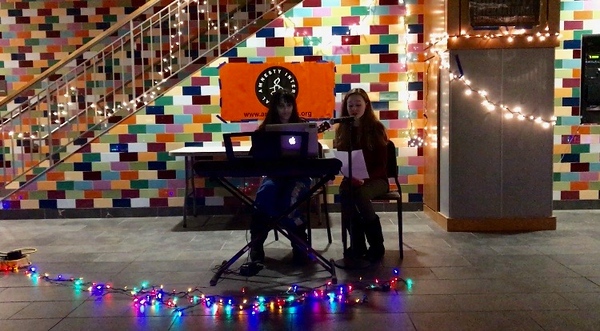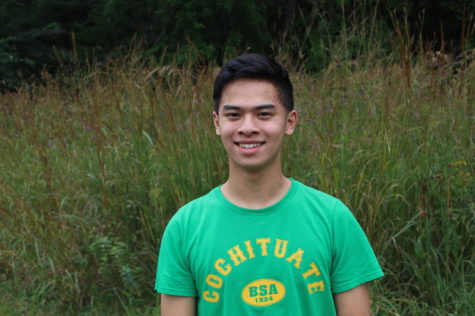At Amnesty Coffee House, students fundraise through camaraderie

Credit: Courtesy of Lindsay Adelman
Senior Lizzy Francis and junior Zoe Hughes sing a duet at last year’s coffee house. The event is organized by the Amnesty International club and features a night of performances to fundraise for the club’s parent foundation. “It’s so important to actually know what’s going on and try to get involved in any way,” senior president Lindsay Adelman said.
January 31, 2019
The Amnesty International club at WHS will host its annual coffee house next Friday, Feb. 8. The main fundraiser of the year for the club, the event’s purpose is twofold: to raise money for the club’s parent foundation, Amnesty International, while also spreading awareness in the student body for the organization’s cause.
Amnesty International, the parent foundation, is a London-based nonprofit international human rights organization that advocates for human rights across the world. According to its statue, the foundation seeks to campaign for a world in which “every person enjoys all of the human rights enshrined in the Universal Declaration of Human Rights and other international human rights instruments.” Founded in 1961, the organization currently performs work that seeks to alleviate political imprisonment, support the plight of refugees and advocate for the rights of women, children, minorities and indigenous peoples.
For senior Mae Zhang, who is co-organizing the event and serving as co-president, the Amnesty club has been close at hand from a young age. Zhang’s older sister, Linda, served as organizer and president of the club before graduating from WHS in 2016. As the younger Zhang was a freshman her sister’s senior year, she followed Linda’s lead and joined the club, eventually becoming president.
“Family-wise, I was kind of obligated to [join the club] since [Linda] was there,” Mae said.
Despite initially being indirectly forced to join the club, Mae quickly found her own interest in Amnesty’s central goal of social and political equality. She was particularly drawn to the coffee house, as she found it a relaxing and supportive atmosphere where performing students can go out of their comfort zone while also supporting a righteous cause.
“It’s an incredible community of people who believe in supporting an important cause while having a good time,” Mae said. “That’s what stuck me to it.”
Mae’s co-president, senior Lindsay Adelman, described the event as a low-stakes talent show and emphasized its camaraderie.
“It’s a really chill talent show,” Adelman said. “We welcome absolutely anyone and are always looking for unique or new performances.”
An avid singer, junior Zoe Hughes echoes Adelman’s sentiment. Hughes has performed twice in the show, and she believes the event’s laid-back and sympathetic environment is what draws performers back each year.
“It’s a really encouraging environment, and it’s a place where you can try out things that you haven’t been able to try out before, because there’s no judgment,” Hughes said. “It’s a rare opportunity to show what you can do in a supportive setting.”
While Hughes noted the coffee house has generally been oriented to a specific set of people or friend groups in the past few years, she emphasized that Amnesty’s cause is universal and encourages others to perform or attend.
“[Human rights] appeals to everyone,” Hughes said. “The more people that perform, the more people that pay to come in and give money to Amnesty.”
Adelman and Mae agreed, noting that they have several groups slated to perform and this year’s coffee house, including the a cappella groups, the k-pop dancers and a variety of individual singers. In pursuit of expanding the event’s performance range, the organizers are reaching out to potential dancers or poetry readers, the latter having historically performed at the coffee house.
“We’re trying to get a variety of different acts,” Adelman said. “Spreading awareness is really important.”
While the leaders aren’t completely sure when the tradition of a coffee house started, Mae recalls that Amnesty has hosted one at WHS every year for the past 10 years. While attendance has had its highs and lows over the years, most recently on a relative low, the organizers hope their diversification of acts will drive up attendance, and as a result, donations to Amnesty.
In addition to hosting a coffee house, the Amnesty Club organizes and participates in a plethora of other fundraisers and events, all tied to its parent’s organization’s goal. Among other events and fundraisers, the club has held bake sales at the dump and made home-warming baskets for a Boston homeless shelter in past years.
All in all, Adelman encourages club members to get involved in supporting causes they believe in, such as the recent nationwide Women’s March on Jan. 19. In attending these events as a group, the leaders hope to build a community not unlike the one at the coffee house.
Like Mae, Adelman believes the organization’s cause is the primary factor driving her interest in Amnesty and her commitment to keeping the coffee house tradition alive.
“We live such privileged lives in Wayland, and it’s so easy to not ignore but live without thinking about what’s going on in the world,” Adelman said. “It’s so important to actually know what’s going on and try to get involved in any way.”
Adelman and Mae urge interested performers to reach out to them at [email protected] and [email protected].





![Last Wednesday, the Wayland School Committee gathered to discuss a number of topics regarding the health curriculum and Innovation Career Pathway course. Another large topic of conversation was the ways to potentially mitigate distracting cell phone usage. "These [phones] are going to distract your learning and social relationships," Superintendent David Fleishman said. "That's concrete right there."](https://waylandstudentpress.com/wp-content/uploads/2025/06/Screenshot-2025-06-04-at-9.49.31 PM-1200x886.png)



























![Troy Hoyt finishes the Boston Marathon, running for the Hoyt Foundation. T. Hoyt is the son of Hoyt Foundation CEO Russ Hoyt.
“[Running a marathon] might seem like a big thing, when it’s presented to you at first, but if you break it up and just keep telling yourself, “Yes, you can,” you can start chipping away at it. And before you know it, you’ll be running the whole 26 miles, and you won’t even think twice about it.” T. Hoyt said.](https://waylandstudentpress.com/wp-content/uploads/2025/04/C36E8761-1CBB-452E-9DF2-543EF7B1095E_1_105_c.jpeg)












































